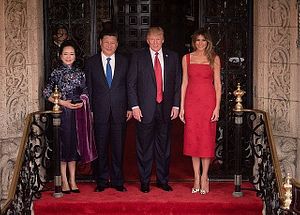The Australian Financial Review recently reported that the United States, Australia, India, and Japan had been considering the establishment of a joint regional infrastructure plan to counter China’s multibillion-dollar Belt and Road Initiative (BRI). Though officials from these countries have hastened to clarify that this plan is not a “rival” but an “alternative” to the BRI, it reflects these countries’ dilemma in how to deal with what they perceive as “the China threat.”
It’s too early to tell how and when this proposed plan may materialize since it is still at the discussion stage. The scope and objectives of this plan are unclear, and no one knows how it is going to be implemented. This is not the first time the four countries, or the “Quad,” have teamed up to attempt to develop a common approach to China. In the recent past they also promoted the concept of “Indo-Pacific” in place of the traditional “Asia-Pacific” (though “Asia-Pacific” remains in active and popular use). One of the purposes behind the “Indo-Pacific” concept is to boost India’s status in the United States’ Asia policy so that the discourse of “Asia-Pacific” will not be dominated by China.
But China has never claimed to be the center or the hegemon of the vast Asia-Pacific region. Healthy competition between major powers is good for all; grouping countries based on political ideology into opposing camps is detrimental to regional cooperation. Obviously attempts to pit the “Quad” against China go against the trend of globalization and interdependence and are counterproductive.
The proposed plan by the “Quad” to counter the BRI is unlikely to become reality for a number of reasons.
First of all, due to their domestic priorities, these four countries have difficulty developing a coherent and consistent approach toward China. A stable relationship with China is crucial to all these economies. Various conservative forces within the “Quad” feel uncomfortable about China’s rise and often launch political or ideological campaigns against China, a reemerging power that does not completely share their values. But in the end realism and pragmatism will prevail.
For example, Australian Prime Minster Malcolm Turnbull’s administration has sounded tough toward China, slashing Beijing for interference in Australia’s domestic politics. However, before his recent trip to the United States, Turnbull set a more conciliatory tone and said China was “not a threat.” In Washington he stated that it was inaccurate to paint the United States and its allies like Australia as being against China in some sort of rerun of the Cold War. While acknowledging some “complex and difficult issues” with China, the Australian government has denied a diplomatic freeze or cold war between the two countries.
The Trump administration, on the other hand, prefers bilateral approaches to multilateral agreements in international affairs and seeks a constructive relationship with China despite differences with China on trade and other issues.
Second, China’s BRI remains open and inclusive, and China welcomes the participation of all countries, including the “Quad.” The idea may have come from China, but it is jointly “owned” by all participating countries and the dividends of development are for everyone to share. Yet the “Quad” countries have been lukewarm to the BRI from the very beginning, though recently they seem to have become more receptive, and both the United States and Australia sent ministerial level official delegations to the May 2017 BRI Forum in Beijing. Still, suspicions remain high. In particular, India opposes the China-Pakistan Economic Corridor.
India and Japan issued the vision document of their proposed Asia Africa Growth Corridor (AAGC) in May 2017 and began to promote it to counter the Maritime Silk Road of the BRI. The AAGC vision document uses some of the same keywords as the BRI such as regional cooperation, quality infrastructure, connectivity, people-to-people exchanges, etc. However, India and Japan have yet to explain, convincingly, why the AAGC is superior to the BRI. As a complement to the BRI, the AAGC should be welcomed by others, including China; as a strategic counterforce against China that raises tensions in the region, it should not be.
Third, even if the proposed plan were to proceed, funding will be a major problem. With Trump’s “America First” policy, is the United States willing to invest in such a huge project overseas? And where will the money come anyway? Japan’s Abenomics has achieved some positive results but a long and winding road lies ahead in terms of its economic recovery. India tends to exaggerate China’s intentions in South Asia and see itself as a peer to China in every aspect while downplaying its domestic problems. China has been Australia’s largest trading partner, largest export market, and largest import source since 2009. It is not in any of the “Quad” countries’ interest to disrupt their dynamic and beneficial relations with China and none is likely to come up with the money needed to fund the proposed project.
Ostensibly the proposed plan is an economic project, but in essence it represents these countries’ political, strategic, and diplomatic efforts to respond to the rise of China. Some people in the “Quad” have still not become accustomed to the new normal of expanding Chinese power and influence. It is understandable that they may feel uncomfortable about or even threatened by China’s massive projects like the BRI. But China’s growth has benefited other countries as well.
It is not China’s job to evenly distribute the benefits of globalization. The best way to deal with China’s rise is not to block it but to work with China and shape Asia’s emerging political and economic orders together. Moving forward, both China and the “Quad” must reaffirm their commitment to cooperation as the only way to address their differences and promote common development.
Zhiqun Zhu, Ph.D., is Professor of Political Science and International Relations at Bucknell University in the United States.

































